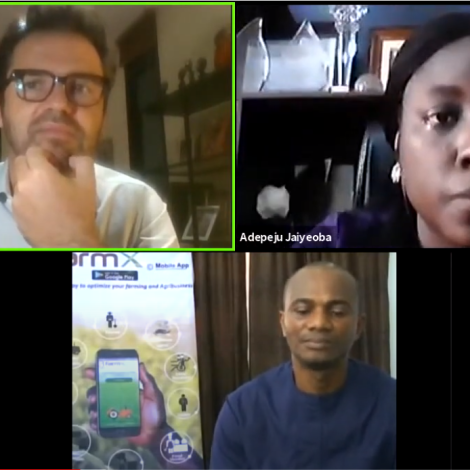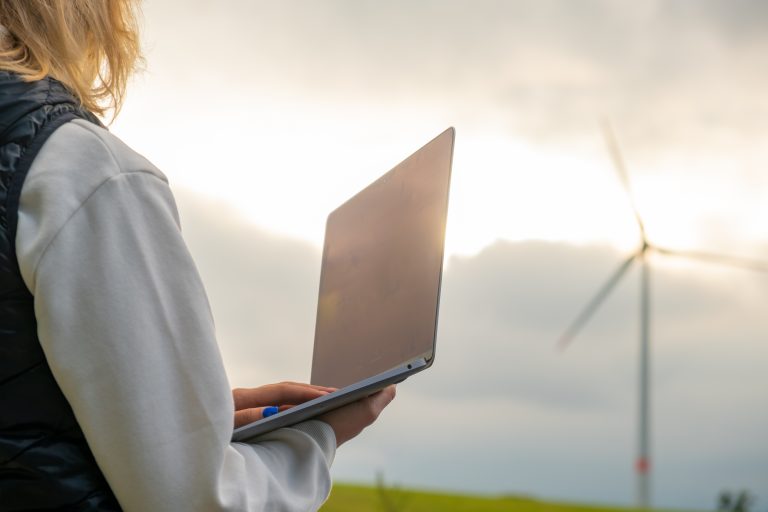From ultrasound on a mobile phone to robo-calls for fortified wheat: the STI Forum delivered innovation for sustainable development.
Tiny startups shared time with titans of international cooperation to discuss their contributions toward achieving the UN’s Sustainable Development Goals at the sixth annual Multi-Stakeholder Forum on Science, Technology, and Innovation for the SDGs (STI Forum). The forum convened organizations both large and small, unified by at least one defining characteristic of high ambition. Here, we highlight some of the unique projects featured at the STI Forum, ranging in scope from a small Ugandan startup developing an ultrasound device that plugs into a mobile phone to a global push to put every school in the world online.
M-Scan ultrasound on a mobile phone
Uganda’s low-cost mobile phone-based ultrasound system M-Scan seeks to reduce maternal mortality through early detection and easy accessibility to affordable ultrasound services, mostly in rural areas. M-Scan was one of the winners of the 2021 STI Forum Call for Innovations Virtual Innovation Exhibition. The device is in the proof of concept stage and has raised nearly (USD) $140,000 for development.
Uganda, like many countries in Africa, has very low access to electricity with a third of the rural population still unconnected. The mortality rate is also high and basic lifesaving technologies to reduce these deaths have been a challenge.
M-Scan is a low-cost mobile-phone-based technology with the potential to improve maternal health in rural Uganda. Many facilities in Uganda do not have the resources required to purchase ultrasound machines. However, with the M-Scan, physicians can connect the scanner to a mobile phone or a laptop using a USB port.
Through preinstalled software, the computer can read the image and provide data. Also, M-scan can be charged through solar power, reducing the need for a connected grid, which is important in areas with poor access to electricity.
African digital entrepreneurs
An interesting conversation kicked off at the STI forum which had a set of entrepreneurs from Africa showcasing how they have made successful social enterprises from digital platforms. Africa’s entrepreneurial ecosystem has been expanding with support from tech hubs in major cities. The growth has been witnessed despite connectivity challenges, digital skills gaps, as well as regulatory and policy obstacles.
A panel hosted by International Trade Centre brought together Fondation Jeunesse Numérique, an Ivory Coast digital youth foundation that creates an ecosystem facilitating the initiatives of young digital entrepreneurs, as well as the Uganda-based motorcycle taxi hailing service Safeboda. Others included Tanzania-based bulk SMS service BEEM, and Briter Bridges, an African startup that supports knowledge infrastructure which informs businesses and leaders across underserved markets, mostly in Africa.
Before the pandemic, Africa counted among the world’s leaders in mobile money accounts, with 300 million in 2020. And more than 500 African companies offered so-called “disruptive” financial technology services. Now, startups and established enterprises working in digital financial innovation, as well as other fields such as healthcare and online education have emerged from the pandemic intact with tools to capitalize on the newly invigorated online market.
See the concept note on the panel at the STI Forum.
The Drought Resilience Impact Platform (DRIP)
Remote sensors can forecast groundwater levels in Kenya, Ethiopia, and Somalia through the Drought Resilience Impact Platform (DRIP). Droughts in northern Kenya and parts of Ethiopia and Somalia have become frequent and more severe. The effect damages communities living in these regions, people who are primarily are herders forced to move long distances in search of water. The available water infrastructure in the region is prone to neglect, while underground water sources can dry out.
To monitor the water available, engineers have been attaching remote sensors to water infrastructure and collecting timely data. The data are shareed with authorities who can track the status of the underground water. This also reports which watering point is functional or which needs repair. Data received, and when acted upon, safeguards the community against total loss of livestock due to drought.
The project was highlighted by Dr. Evan Thomas, Director, Mortenson Centre in Global Engineering, stationed at the University of Colorado Boulder during a side event organized by Engineering for Change. The project is a collaboration of CU Boulder, the US National Science Foundation, NASA, the Kenya National Drought Management Authority (NDMA), and others.
Learn more in this video, Ending Drought Emergencies in the Horn of Africa
Giga Internet infrastructure for schools
Giga is a program that intends to build Internet infrastructure to put the world’s schools online by 2030. This is a project of the International Telecommunications Union (ITU) and UN Children’s Fund (UNICEF).
There are over 3.7 billion people in the world who are not connected to the Internet. Giga plans to put a dent in that number, starting with mapping the real-time connectivity of every school in the world. To date, Giga has mapped more than 9,000 schools in 35 partner countries. The program aims to deliver at least 10Mbps in schools, enough bandwidth for educational pursuits as well as recreation and innovation, the program’s leaders say. In sub-Saharan Africa, the project uses Artificial Intelligence to rapidly map schools. Last year, in just seven months of implementation, the project was able to map 23,000 schools in Kenya, Rwanda, Sierra Leone, Niger, and Ghana.
Alex Wong, chief of special initiatives to the director of Telecommunications Development Bureau at ITU, presented at the STI Forum side event sponsored by Engineering for Change by
Harnessing digital extension to promote zinc-fortified wheat
Zinc deficiency is a common occurrence in low- and middle-income countries and scientists have been working on ways to solve the challenge. Adequate zinc micronutrient consumption helps in developing immunity, reproduction, gene expression, and cell division.
In Pakistan, where a similar challenge exists, researchers have implemented a pilot project to sensitize farmers in the Punjab region to adopt a variety of wheat fortified with zinc. The outreach is a digital campaign that has sent farmers nearly 1 million SMS messages and placed 967,668 robocalls.
The project is implemented by Precision Agriculture for Development (PAD) in partnership with HarvestPlus.
Learn more about HarvestPlus and biofortification of food crops at the STI Forum.
GH4STEM Juneos Challenge
In Ghana, the uptake of Science, Technology, Engineering and Mathematics (STEM) has been steadily rising, though not to the levels of other regions globally. Education policy analysts have recommended the introduction of sciences at a younger age to capture the attention of junior learners.
One program that is achieving this is The GH4STEM Juneos Challenge, a TV production based in Ghana. This is a 15-episode practical STEM reality TV series that features 100 Junior scientists across Ghana, 65 percent of which are girls.
The show is part of the WeGo Innovate Edutech platform that collaborates with schools and other academic institutions to transform educational content into fun, interactive tools to inspire the next generation of scientists. The practical STEM reality series involves students using local materials to perform STEM experiments and explain otherwise complicated science phenomena.
GH4STEM Juneos Challenge was part of the winners of the 2021 STI Forum Call for Innovations Virtual Innovation Exhibition. Learn more about the challenge at the STI Forum.
A Lebanese app for COVID-19 contact tracing
Ma3an App– Covid-19 has brought up several interventions meant to address the challenges many people have been going through. The United Nations Interagency Task Team on Science, Technology, and Innovation (IATT) Report for the STI Forum 2021 featured a Lebanese mobile app that has been acclaimed for helping with contact tracing.
When Covid-19 struck many regions around the world, health officials were met by the extreme need to trace people who might have had contact with a person testing positive. Contact tracing is a complicated process and health officials in Lebanon relied on this mobile phone app to alert users if they have come into contact with a Covid-19 case.
Learn more about Ma3an in this video.
Innovations for vulnerable communities
One of the standout events at the STI Forum was a “virtual innovation exhibit” in which six innovators discussed their work with vulnerable communities. The panelists work among survivors of violence against women, the LGBTQ community, people with disabilities and other underserved groups worldwide.
About the Author
Kimani Chege is the 2021 Editorial Fellow at Engineering for Change, a freelance journalist and a media trainer with DW Akademie, a branch of the German broadcaster Dutche Welle (DW). At DW Akademie Kimani trains radio stations on financial management, new revenue streams and other topics. Previously, he was the coordinator of a science journalist association in Kenya.

